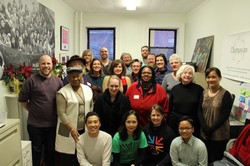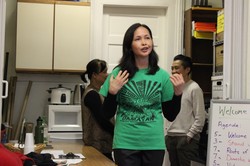When Lydia Catina-Amaya left her home in the Philippines, she had dreams of becoming a missionary in the United States. Encouraged by what she thought was a Christian organization, Catina-Amaya soon found herself in a situation she could not escape. She was lured into becoming a domestic worker for a family in New York City. Her “employer” took her passport and papers and promised that if she stayed, she could reach her goals within two years.
That would not be the case. Catina-Amaya became one of thousands of export workers from her country, caught in a human trafficking nightmare. Working as many as 19 hours a day with little pay and no time off, she was trapped.
Special Offerings Ambassadors, working through the Special Offerings Leader Support Network (SOLSN), recently learned how the Presbyterian Mission Agency is helping people like Catina-Amaya. SOLSN met for training last week at Stony Point, New York, and spent a half day visiting the Damayan Migrant Workers Association, Inc. in Manhattan’s Hell’s Kitchen.
Damayan is a grassroots organization led by Filipino women domestic workers. Founded in 2002, the organization fights for labor, health, gender, and immigration rights and is working to build a domestic workers movement toward fair labor standards, dignity, and justice. The Presbyterian Committee on the Self-Development of People provided grant funding for the organization.
“I came to this country because I believed I could be a missionary, only to find myself trapped as a domestic worker for a family,” she says. “It was a 24-hour job with no days off. Going out by myself was hard, and I made very little money. I didn’t know what my rights were or where to turn. There was no one to trust.”

Special Offerings ambassadors heard from Damayan staff about how gifts through the church have helped the organization fight for migrant workers’ rights. —Rick Jones
Catina-Amaya says her employer kept her papers and passport and threatened her with deportation if she didn’t follow the rules. Eventually, she was encouraged to go back to her own country and was even given her papers. But knowing there was nothing back home, Catina-Amaya escaped her “employers” and sought help in the big city.
“I didn’t want to go back home, but I didn’t know what my rights were or where to turn,” she says. “But getting involved with Damayan changed my life. I can talk now, and I learned from my experience. I just wanted to have a good life, and now I am able to trust again.”
Now married, Catina-Amaya is one of several community organizers for Damayan. She and other staff work to help others. Since its inception, Damayan has recovered more than $600,000 in stolen wages for individual workers, assisted over three dozen trafficked workers, reunited families, and recruited more than a thousand domestic workers and other low-wage worker members.
The visiting Presbyterian ambassadors were impressed with what they heard and saw.
“It’s hugely impactful, because I live 45 minutes from a city, and there are not a lot of programs that people can tangibly see to try and share with people on what is really going on,” says Rev. Jeromey Howard, pastor of the United Christian Presbyterian Church in Richmond, Missouri. “When you go to the center and see people reclaiming the power they’re given, seeing that made possible through what’s given to the special offerings, it allows people to be a part of it and a part of God’s work.”
Rev. Laura R. Donovan is an ambassador for special offerings in the West Jersey and Philadelphia presbyteries. The Damayan visit struck a chord with her because she had a family member who was trafficked.
“I’m not sure why we call it trafficking when it is actually slavery,” she says. “It’s a dirty word in America, but let’s face it, it’s slavery, and it’s illegal by the constitution, but there are so many systems that encourage it to happen.”
There are currently 26 ambassadors serving with the SOLSN this year. To find out how to invite an ambassador to help your church or presbytery or to become an ambassador yourself, contact sally.wright@pcusa.org or click here.

